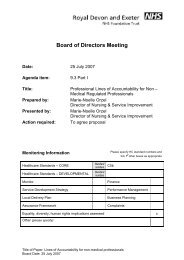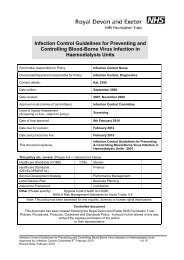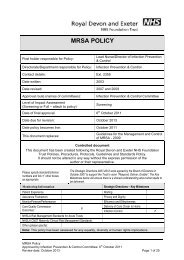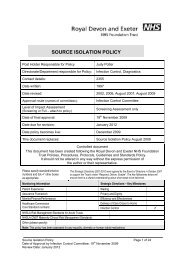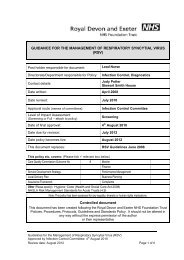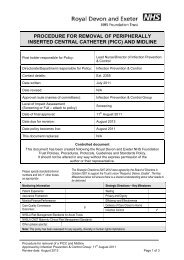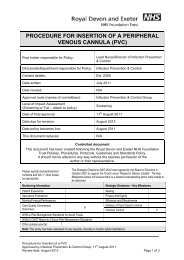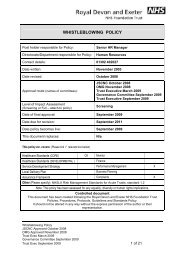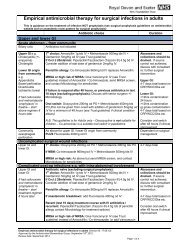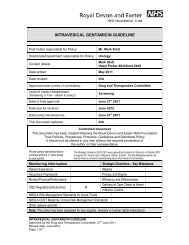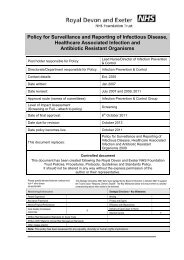Annual Report 2006 - Royal Devon & Exeter Hospital
Annual Report 2006 - Royal Devon & Exeter Hospital
Annual Report 2006 - Royal Devon & Exeter Hospital
Create successful ePaper yourself
Turn your PDF publications into a flip-book with our unique Google optimized e-Paper software.
SpecialisingAs oncologybecomes morecomplex withtime and moreexpensive drugsemerge it isnot surprisingthat a highemphasis hasto be placedon oncologypharmacymanagement.I have been inthis role for 16years now and Iwould envisagethe need for itto grow year onyear as modernmedicinescontinueto moveforward. uLIBBY HARDY”9“Our well-established specialist units — MardonNeuro-rehabilitation Centre, <strong>Exeter</strong> Mobility Centreand Honeylands Children’s Centre — are just the tipof the iceberg when itcomes to specialising atthe RD&E. The workforceincludes a myriad ofhighly specialist rolesacross all directorates.In January <strong>2006</strong>, forexample, we appointeda Lupas UK Nurse, who isusing her musculoskeletalnursing experience tomeet the complex needsof Lupas patients. Inradiotherapy and nuclearmedicine the nature ofthe equipment meansthat we employ speciallytrainedhousekeepersto clean in these areas.Specialist dieticians workwith specific diseaseprocesses and clinicalpharmacists (like LibbyHardy, left) are assignedto every speciality in thehospital, from cardiologyto vascular medicine. Libby, for example, is theTrust’s Senior Cancer Services Pharmacist and alsoLead Pharmacist for the Peninsula Cancer Network.CASE NOTES: RESPIRATORYPHYSIOTHERAPY TEAMAT THE RD&E OUR TEN RESPIRATORY PHYSIOSSEE 4,000 NEW PATIENTS PER YEAR AND PROVIDE21,000 TREATMENTS. WE ARE THE REGIONALCENTRE FOR CYSTIC FIBROSIS PATIENTS ANDCHILDREN RECEIVING SCOLIOSIS CORRECTIVESURGERY, ALL OF WHOM REQUIRE SPECIALISTRESPIRATORY PHYSIO INPUT.Respiratory physiotherapy has many functions:• aids airway clearance in acute patients;• facilitates early recognition and preventionof potential respiratory deterioration inpost-op and post-trauma patients;• empowers patients in disease management;• increases function and quality of life forthose with chronic disease.Respiratory physiotherapy takes place across allclinical areas, although most of the team’s workstems from the ITU, surgical wards, respiratorymedicine and outpatient respiratory patients. Inaddition, 24-hour cover provides treatment to theacutely unwell respiratory patients. Our outpatientphysio service includes treatment of patients withdysfunctional breathing patterns. The Trust alsoruns four pulmonary rehabilitation programmes for60 patients per year — an exercise and educationprogramme for those with chronic respiratorydisease to increase stamina, exercise toleranceand quality of life.CASE NOTES: NURSE CONSULTANT SAFEGUARDING CHILDRENLIAISING CLOSELY WITH THE NAMED CHILD-PROTECTION DOCTORS, CLAIRE MITCHELL’S POST INVOLVESJOINED-UP WORKING WITH EMPLOYEES OF THE RD&E AND EXETER PCT TO ENSURE THATSAFEGUARDING CHILDREN AND PROMOTING THEIR WELFARE IS FIRMLY EMBEDDED WITHIN THECULTURE OF BOTH ORGANISATIONS. BY JOINT FUNDING THE POST, THE MANAGERS OF BOTH TRUSTSHAVE RECOGNISED THE IMPORTANCE OF CROSS-BOUNDARY WORKING TO SAFEGUARD CHILDREN.Among her many other tasks, Claire Mitchell teaches, advises and provides consultation for all employees,supports staff when attending child-protection meetings, produces reports and, in rare cases, attendscourt. In serious cases, she is involved in completing the organisation’s report to the <strong>Devon</strong> LocalSafeguarding Children’s Board serious case review.Combining the role of named nurse for child protection with nurse consultant role is unusual, there beingonly two such posts in the South West. The combination emphasises the importance placed on provisionof expert advice and consultation grounded in evidence-based research and practice. It also recognisesthe role of nursing in providing leadership to develop and empower all staff to provide a proactive,preventative approach in this difficult and sensitive area of work. Ensuring effective training, backed upby robust procedures and organisational support systems, can enable staff to be alert to the early signs ofsignificant harm to children and be an initial catalyst for a responsive multi-agency approachto support parents and prevent further harm to a child.“”



